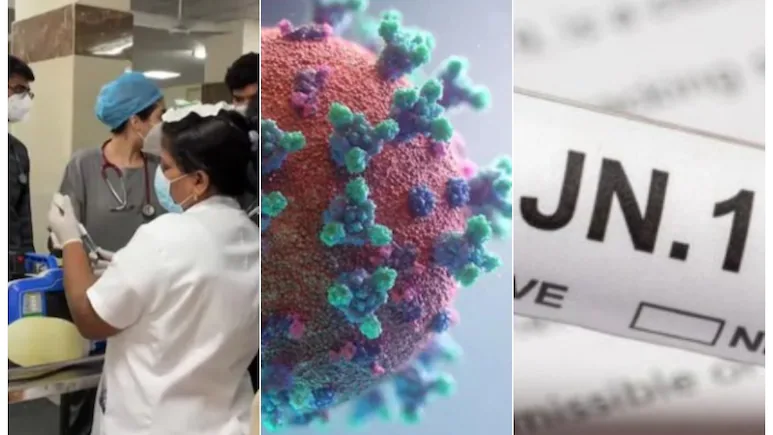India is currently experiencing a noticeable resurgence in COVID-19 cases, with the number of active infections reaching 2,710, according to the Union Health Ministry’s latest update. This jump comes after a period of minimal activity and marks a five-fold increase in cases since May 25, when infections had just crossed the 1,000 mark.
Kerala continues to report the highest share of active cases, with 1,147 infections. Health officials have suggested that Kerala’s lead may be linked to its higher testing rate. Maharashtra follows with 424 cases, while Delhi and Gujarat have registered 294 and 223 active cases, respectively. Other states with notable case counts include Karnataka and Tamil Nadu (148 each), and West Bengal (116).
Despite the rise in numbers, health authorities have confirmed that the majority of infections are mild. The most commonly reported symptoms resemble those of seasonal flu — including fatigue, low-grade fever, sore throat, and nasal congestion. There have been no indications of widespread severe disease.
Seven COVID-related deaths have occurred in the past 24 hours, raising this year’s total to 22. Most of the deceased were senior citizens with underlying health conditions. Maharashtra accounted for two deaths: a 67-year-old man with pneumonia and diabetes, and a 21-year-old male suffering from diabetic ketoacidosis. Delhi, Gujarat, Punjab, Tamil Nadu, and Karnataka reported one death each, with the causes often complicated by existing medical issues such as heart disease, kidney failure, and respiratory disorders.
State Governments are Taking Adequate Steps
In response to the spike, several state governments have taken precautionary measures, directing hospitals to ensure that testing kits, oxygen supplies, ICU beds, and vaccines are readily available. Elderly individuals and those with pre-existing illnesses have been urged to wear masks in crowded spaces and follow standard COVID safety practices.
Meanwhile, genomic surveillance data from the Indian SARS-CoV-2 Genomics Consortium (INSACOG) has shown that the JN.1 variant remains the most widespread strain, found in 53% of tested samples. Other variants currently circulating include BA.2 (26%) and several Omicron sub-lineages (20%).
Health experts believe that the recent increase in infections may be partly driven by two newly identified Omicron sub-variants LF.7 and NB.1.8.1. Although these strains are more transmissible and may partially evade existing immunity, the World Health Organisation (WHO) has not categorised them as Variants of Concern or Variants of Interest. They remain under the classification of Variants Under Monitoring.
India’s surge appears to reflect similar trends in several Asian countries, where these sub-variants are contributing to localised outbreaks. However, as of now, there is no evidence that LF.7 or NB.1.8.1 lead to more severe disease or higher mortality.
ICMR Advises Citizens to Remain Alert
The Indian Council of Medical Research (ICMR) has advised the public to remain alert but not overly concerned. Dr. Rajiv Bahl, Director General of ICMR, emphasised that enhanced precautions are not necessary for the general population, although those with compromised immune systems should avoid exposure.
In an unexpected development, Mizoram reported two COVID-19 cases its first since October last year. Several other states have also reported low numbers of infections. Rajasthan recorded 51 cases, Uttar Pradesh 42, and Puducherry 25. Haryana has 20 active infections, while smaller figures were reported in Andhra Pradesh, Madhya Pradesh, Odisha, Punjab, Jammu and Kashmir, and Goa. Some northeastern states such as Arunachal Pradesh and Assam have each registered two or three cases.
The Health Ministry noted that while these figures are low, all states should stay prepared. Union Minister of State for Health and AYUSH, Prataprao Jadhav, assured that India’s health infrastructure, including ICU beds and oxygen plants built during previous COVID waves, has been reviewed and is ready to respond to any potential escalation.
Experts Suggests to Stay Home if Detected with Covid
“We’re in close contact with state health departments, and preparations are already in motion. Our systems are in place, and we are monitoring the evolving situation closely,” the minister said on May 30.
Experts recommend that anyone experiencing COVID-like symptoms should isolate at home, maintain distance from others, wear masks, and manage symptoms with rest and hydration. Medical advice should be sought if symptoms worsen, especially for individuals over 60, or those with conditions like diabetes, chronic respiratory illness, or weakened immunity.
As India navigates this latest uptick, the emphasis remains on preparedness, responsible public behaviour, and timely reporting, rather than panic.


